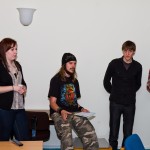I went to a Teaching and Learning Conference on Technology Enhanced Learning run by my faculty last week and soon found myself caught up in a welter of newly coined words and an array of freshly minted acronyms. I learned how my colleagues were using our VLE (Virtual Learning Environment) and video to create a ‘flipped classroom’ where students engage with new information in a new and exciting way. I heard about blogs and websites being an increasingly popular way for students to produce material for assessment, and how podcasts are being used to provide better feedback and support for students. Finally, I discovered that, with the power of MOOCS (massive open online courses) and SPOCS (small private online courses) we could aim to educate well beyond the boundaries of our campus.
At times it would have been easy to wonder how this could apply to English Literature as a subject for study, given that it all felt very instant and spontaneous and our subject relies on contemplation and gradual exploration. Indeed, there were moments when all of the new words and acronyms made it seem almost anti-literary, even anti-language. That is nonsense, of course. We regularly cajole our students into trying new words. I run an entire seminar on text/techno language and its impact on our lives. We tell our students to be precise and effective in their use of language, but to remain open to new textual and linguistic options. What was happening to me was what I encourage in my students.
It might have seemed unfamiliar to some colleagues to be asked to consider how they could facilitate learning using these methods, but then that is the whole point. These new ways to teach and to learn are ripping up some of our comfortable old assumptions and challenge us, quite rightly, to justify how we teach and to articulate more precisely what we anticipate that our students can learn.
Although I call these ‘new’ ways to teach and to learn, many of them have been around for some time now and they are working. They do not require us as lecturers to abandon all of the ways in which we know we can teach well, but they do give us invigorating news ways in which to work with our students. That is perhaps the most striking thing about teaching methods which employ technology in one way or another: they all rely on students as active, and enthusiastic, participants who are prepared to take a leading role in their learning. Once that facet of technology enhanced learning is grasped, it all becomes simple: that is what we have been encouraging our students in English Literature to do for many years.
It occurred to me as I sat in the conference that, more often than you might expect, being a lecturer is not that different from being a student. When you first come to university you are faced with words which you might not understand and abbreviations that you have never heard before. You are asked to respond to our teaching, and this will sometimes require you to learn in a wholly new way. It can be bewildering at first but the aim is still the simple one I mentioned a moment ago. We want to help you to learn in a way that allows you to be your own person, fuelled by your own imagination and desire to grow. We will provide the tools that you need, we will encourage and direct you and if sometimes the whole process seems muddly or daunting, think of me at the conference, having to remember all of those new terms. We really are all learning together.





